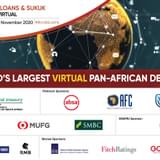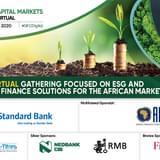The Mozambican government has announced that it will have to restructure its debt in order to receive further financial aid tranches from the IMF.
The country’s finances are not in good shape. Government reserves have fallen from US$3.1bn in 2014 to US$1.7bn at present. Government debt to GDP could reach 130% by year’s end, according to a presentation to investors by the Mozambican government seen by Bonds & Loans.
Furthermore, the country faces a US$38mn coupon payment in January according to Bloomberg, despite the fact that Mozambique’s 2017 repayment capacity is only US$25mn.
The country’s predicament worsened following the US$850mn bond swap from Ematum for government paper in April, after which US$1.4bn worth of undisclosed loans were revealed, prompting the IMF to suspend its aid packages.
“The situation in Mozambique has gone from bad to worse, and has not been helped by the lack of communication from the government’s side,” said Joe Delvaux, senior fund manager – Duet Africa Credit Fund, Duet Asset Management Limited.
Although yields on 2023 government bonds rose by up to 583bp to 21.11% according to Bloomberg, the news has not come as a surprise to some.
“I have been bearish Mozambique since 2015,” stated Delvaux, who advised clients last year that Mozambique would likely need to restructure its debt.
Others agreed. A Sub-Saharan Africa (SSA)-focussed banker noted that the announcement comes off the back of the need to ensure that government’s relationship with international officials is preserved – particularly the IMF.
According to government authorities, the country’s debt ratios are already above those required for access to additional financial assistance from the IMF.
Figures from the government’s presentation to investors shows that the present value of external public and publicly guaranteed debt (PPG) to GDP for 2016 stands at 67%, noticeably higher than the IMF’s threshold of 40%.
As Mozambique is one of the poorest countries in Africa, it is unlikely that the IMF will completely cut aid packages, if only for humanitarian reasons, but the organisation is still bound by its charter – meaning it cannot provide even concessional lending if the recipient is unable to honour its debts.
As a result, the IMF will likely assist in negotiations with bondholders over a debt restructuring, but will not disburse funds until a restructuring plan is in place.
This does not mean that a restructuring will be easy. From some creditor perspectives, the concern is about transparency and the full use of proceeds, rather than whether the level of debt is sustainable.
Alongside trust, the debt aspect will play an important role in convincing creditors to go through with a restructuring.
“The main difficulty for the authorities is that private sector debt is only 20% of their total debt. A small haircut would not bring down leverage and meaningfully impact the debt matrix,” said Lucie Villa, VP and senior analyst – sovereign risk group at Moody’s, adding that the main focus of the restructuring would largely revolve around negotiations.
She added that the legal aspect will play an important role here – which explains why the authorities have hired White & Case and seasoned debt restructurer, Lazard.
The silver lining for Mozambique is that a restructuring may not face too much resistance from investors, though the government is in a position where it has to reimburse dollar-denominated debt at the moment when their financial reserves are under pressure.
“It is difficult to see any options other than a debt restructuring followed by and IMF financial aid package,” she said.
Although it seems clear where the government is heading regarding the country’s outstanding bonds, what will happen regarding Mozambique’s loans remains another question.
Furthermore, the proposed restructuring could encounter difficulties because of the tight timeline provided by authorities, which want an agreement in principle with investors in December and implementation of a more detailed plan in January 2017.
“This is not a lot of time and raises the spectre of potential delays, which could complicate the restructuring process,” Delvaux said.
Despite these concerns, it is clear the country is on the right path in trying to get the situation back under control, with IMF assistance. The Mozambican Central Bank’s new governor, a former IMF banker, raised interest rates by 6% to 23.25% in October in an attempt to stabilise its currency, the metical, which is a step in the right direction in trying to appease his former employer.
The metical has lost over half its value since 2014, and has weakened 39% versus the dollar this year according to Bloomberg. It is currently trading at 77.2100 to the dollar. Inflation is also predicted to rise to 34% by the end of the year. It was reported at 22% in August.
In addition to attempts to stabilise the currency, which could lower its FX liabilities, the main issue still remains Mozambique’s foreign currency denominated debt, which currently stands at 80% of total debts and is one of the highest in SSA.
In getting its proven gas reserves online, the country will receive a much-needed source of foreign currency, which will likely see its fortunes change.
Both Eni and Anadarko are developing huge proven gas reserves, and have not been willing to let them go despite delays in their development because of their importance to Mozambique’s prosperity. The former’s project amounts to around US$8bn, whilst the latter’s is around US$12bn. Delvaux noted that these two parties are essentially funding Mozambique’s FDI. Bloomberg noted that these projects would boost government revenue by around US$2bn per year between 2021 and 2025.
“A lot of investors have stayed with Mozambique precisely because of the growth prospects these projects provide. They are taking the long view,” Delvaux added.
Others agree. Villa said that the impact on its finances of the country’s gas reserves coming online would be massive – a game changer, some have suggested.
“Because Mozambique’s economy is so small, the moment these projects become active they will provide a huge boost to the overall macro-growth and government revenues.”
Despite depressed commodity prices, the difference between Mozambique and other African energy exporters such as Angola and Nigeria is that the latter two are already producing and exporting, whilst Mozambique is still in the initial development phase.









